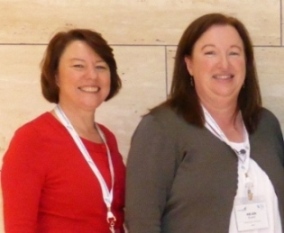 Charles
Sturt University (CSU) research indicates that poor oral English skills and barriers
to acquiring English language proficiency may profoundly disadvantage humanitarian
migrants' ability to settle.
Charles
Sturt University (CSU) research indicates that poor oral English skills and barriers
to acquiring English language proficiency may profoundly disadvantage humanitarian
migrants' ability to settle.
The research, which highlights the importance of supporting migrants to learn English, was conducted by Professor Sharynne McLeod (pictured left) and PhD student Ms Helen Blake (pictured right) at CSU's Research Institute for Professional Practice, Learning and Education (RIPPLE). It used data from 'Building a New Life in Australia: The Longitudinal Study of Humanitarian Migrants' provided by the Department of Social Services (DSS) and the Australian Institute of Family Studies (AIFS).
"The significance of this study is that it provides valuable insight into how English skills facilitate multilingual speakers' participation in Australian society," Ms Blake said.
"The findings indicate that oral English proficiency has a significant impact on their settlement experience, and highlight the importance of supporting humanitarian migrants' English language learning."
This study drew on data from 2 399 respondents from 1 509 households interviewed in 2013-14. Respondents arrived in Australia three to six months prior to Wave One (offshore) or were granted permanent protection in the same period (onshore). Prior to arrival in Australia, 80.1 per cent of the migrants in the study spoke English 'not well' or 'not at all'. By Wave One, 71.4 per cent of migrants reported 'studying English'.
Ms Blake said there were a number of factors that impinged negatively on migrants' ability to learn English.
"Barriers to study included child care responsibilities, health problems and disability, balancing work and English study, and low literacy prevented some humanitarian migrants from participating in English classes," she said.
"Some positive outcomes were reported, such as improvements in English proficiency, with individuals with higher proficiency achieving better outcomes and more positive settlement experiences. But individuals with poor oral English skills were especially vulnerable and in need of support to undertake any activities that would help them to settle and become self-sufficient."
Migrants reported their English proficiency hindered their efforts to find housing (40.9 per cent of households) and get help (52.4 per cent). English skills were also a cause of stress (56.5 per cent), and a reason they were finding it hard to settle (64.3 per cent). All participants reported difficulties finding employment. Of those who were either already employed or reported having looked for work, 48.7 per cent indicated that English proficiency hindered efforts to find employment.
Self-sufficiency (that is, knowing how to: find a house, look for a job, use public transport, get help in an emergency, use bank services, or find out about government benefits) improved over time. After English proficiency, age (neither too young nor too old), gender (male), education (more than 12 years), and time since arrival (more than one year) were significant predictors of self-sufficiency.
"The identification of factors that predict self-sufficiency will inform the understanding of people who provide support for humanitarian migrants," Ms Blake said.
"This study will inform policy development and improve programs for humanitarian migrants to ensure future migrants have a more positive settlement experience and become self-sufficient as soon as possible."





Social
Explore the world of social